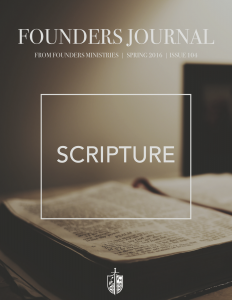No statement from the 1689 Second London Baptist Confession has anymore relevance in today’s Christian world than the following paragraph which articulates the Protestant doctrine of sola Scriptura: “The whole counsel of God concerning all things necessary for his own Glory, Mans Salvation, Faith and Life, is either expressely set down or necessarily contained in the Holy Scripture; unto which nothing at any time is to be added, whether by new Revelation of the Spirit, or traditions of men” (Chapter 1, Paragraph 6). This is a clear articulation of one of the great Reformation era solas. In sum: the Scripture alone provides all that is necessary for life and godliness. This great doctrine, sola Scriptura, is considered the formal cause of the Protestant Reformation, while its companion doctrine, sola fide, became the material cause.1 The affirmation of sola Scriptura cuts across the grain of ancient (and modern) Roman Catholicism and, in more recent days, across the grain of modern Pentecostalism. Both Roman Catholicism and Pentecostalism (broadly defined),2 while at opposite ends of the theological spectrum, agree in this principle denial—the Scripture alone is insufficient for Christians as a guide to life and godliness. The difference between how Roman Catholics and contemporary Pentecostals handle sola Scriptura is simple: Roman Catholics deny this affirmation in principle while Pentecostalism, which affirms sola Scriptura in principle, denies it in practice.
Roman Catholics, for example, insist that the reformers got this emphasis wrong.
The issue of authority remains the most fundamental source of division between Catholics and Protestants. Mainline Protestants (Lutherans, Presbyterians, Anglicans, Episcopalians, Methodists, etc.) do not reject tradition or ecclesial authority; indeed, they have a high regard for both and believe that Scripture can only be interpreted correctly within the context of the creeds of the early Church. However, Protestants believe that only Scripture is exempt from the possibility of teaching error.
Modern Catholic apologists attempt to refute sola Scriptura at every turn. It is one of the most important and essential distinctions between Roman Catholicism and Protestantism. In 1994, a group of evangelical and Roman Catholics leaders sought to hammer out a statement that marked the basic agreement between the two theological positions for the sake of the Church’s larger mission. “As Evangelicals and Catholics, we dare not by needless and loveless conflict between ourselves give aid and comfort to the enemies of the cause of Christ.”3 The implication here was clear. There is sufficient doctrinal agreement between the two groups so that they can together make common cause. Many Baptists consider themselves a part of the broad evangelical consensus.
What ECT failed to consider was the radical disconnect between the historic Roman Catholic doctrine of the Scripture that affirms an authoritative role for tradition in the life of the Church and the Protestant (evangelical) doctrine of sola Scriptura. Certainly there is a place for the Scripture in the Catholic Church, but not as the source of life and godliness. The Bible plays a role, but not a large or even central role in Roman Catholicism. Individual Catholics often do not see the need to read and study the Scripture for themselves. A Roman Catholic layman told me nearly forty years ago, “My priest tells me everything I need to know about the Bible.” He had no need for personal Bible study. It was up to the priest to interpret the Scripture for him and to guide him spiritually. He did so with the aid of the tradition—the Fathers—and the Magisterium, whose opinions on the Scriptures completed, affirmed, repeated, and even corrected, the written revelation from God.
Opposing this position, defending sola Scriptura, stand some of the stoutest Baptist worthies. John Gill (1697–1771) among the greatest of our theologians wrote
The scriptures are the only external guide in matters of religion; they are the way-posts we should look up unto, and take our direction from, and should steer our course accordingly: To the law and to the testimony: if men speak not according to this word, it is because there is no light in them (Isa. 8:20); we should not believe every spirit, but try them, whether they are of God (1 John 4:1); and the trial should be made according to the word of God; the scriptures should be searched, as they were by the noble Bereans, to see whether the things delivered to consideration are so or no; the inscriptions on these way-posts should be read, which are written so plain, that he that runs may read them; and they direct to a way, in which men, though fools, shall not err …4
On the other end of the theological continuum is Pentecostalism with its place for the ongoing role of Holy Spirit-driven prophecy. One can see the practical denial of sola Scriptura in Charismatic Episcopalian priest David Bennett’s book The Holy Spirit and You. “The eighth gift in our study is ‘the word of knowledge.’ It is the supernatural revelation of facts, past, present and future, which were not learned through the efforts of the natural mind. … This gift is used to protect the Christian, to show him how to pray more effectively, or to show him how to help others.” This gift is coupled with “the word of wisdom,” “the sudden and miraculous giving of wisdom to meet a particular situation, or answer a particular question, or utilize a particular piece of knowledge, natural or supernatural.”5
God “speaks” to people today and fills Pentecostals with messages of inspiration and dread. As one follows the popular Pentecostal magazine, Charisma, one is inundated with a plethora of prophetic utterances. Recently, Michelle Darnell’s entrance into politics was guided via prophecy. “Every step of the way, she says, has been confirmed by prophecy.” For Pentecostals, God “speaks” to people today in personal and ongoing ways that have little or nothing to do with biblical revelation. Life decisions are made not by consulting the written Word but by some form of personal prophecy, dreams, visions, prophetic utterances by others. Even mild continuationists argue that God leads people through revelatory dreams and personal visions that are impossible to verify. I recently heard a professor at a Baptist institution state that one of the things he used to determine God’s will about his move to a new institution was the dream of a believer in his local church. God “told” that friend that this man was about to make a major move. This “sign” confirmed for the professor the unique will of God for his life, quite apart from the written Word of God. It was a stunning affirmation but not unusual in our current evangelical world.
Prominent evangelical theologian Wayne Grudem, whose view of prophecy, while quite out of step with historic Reformation views, attempts to distance himself from the charge of denying sola Scriptura. “The sufficiency of Scriptures does not mean that God will not give additional specific directions to individual persons for them to obey (such as a calling to serve in a certain church, or a calling to the mission field, etc).” For Grudem, sola Scriptura applies solely to “the moral standards that he requires for all Christians to obey during the church age.”6 Grudem has a two-tiered approach to prophecy—Old Testament prophecy was infallible, with death as the penalty for a prophet who misspoke, (Deuteronomy 13:1-5). New Testament prophecy may be flawed and mistaken. Grudem’s view of prophecy is merely “telling something that God has spontaneously brought to mind.”7 Those who spoke infallibly in the New Testament and corresponded to the Old Testament prophets were the apostles.
Other Pentecostals are more pronounced in their views that seem to oppose sola Scriptura. The Bible isn’t enough for many believers. The notion of a sufficient Scripture seems to mitigate any need for ongoing revelation. If God’s Word is (already) a lamp to our feet and a light to our path (Psalm 119:105), if God’s Word is the means by which believers are being sanctified (John 17:17), what role is left for personal revelation? Yet personal revelation is one of the central features of modern Pentecostalism and there is little if any role, in many Pentecostal services, for the exposition of the Word as a guide for Christians. According to the testimony of a former Charismatic
This is what I found: there were many conversations among the church leaders, or with “discerning members,” who were concerned that there was a diminishing of the prophetic on Sunday or in prayer gatherings. The absence of such words was a sign of sickness. Rather than being glad at the faithful ministry of the Word in preaching, we were concerned with the absence of the prophetic. Though denied on paper, in practice, such words were given more weight than preaching — but not as much weight as Scripture.8
This practical outworking of Pentecostalism is part of the critique of prominent evangelical pastor John MacArthur. “Rather than instilling a greater appreciation for the Spirit-inspired Scripture, which God exalts as high as His own name (Ps. 138:2), the Charismatic Movement drives people to look for divine revelation in boundless places outside of the Bible.”9
Recently the author attended a Sunday morning service at the largest church in East Africa, Winner’s Chapel, in Nairobi, Kenya. During the first three hours of the four-hour service, little time was given to the Word of God in any direct way. Scriptural concepts were articulated—e.g. “ye shall know the truth, and the truth shall set you free,” but not in a way that placed the concept in its biblical setting. It was a slogan that was repeated almost as a magical phrase. For three long hours, there was no clear sustained focus on the Word of God. While it is to be admitted that this is but one example, the Winner’s Chapel is among the largest of the African Prosperity Gospel churches and its influence throughout Africa and the world is hard to quantify.
I have also visited Pentecostal services at a large Minneapolis area church and heard several of the most prominent names in the modern Pentecostal/Prosperity Gospel movement (Reinhart Bonnke, and Kenneth and Gloria Copeland). Again, the selection of services in limited but these names are among the top tier of Pentecostal celebrities. The use of the Scriptures in these services focuses less on the power of the Word for Christian faith and life and more on the Scripture as a self-help book on financial success. Gloria Copeland attributed her view of divine prosperity to Kenneth Hagin. Once she and her husband Ken learned the prosperity principles from Hagin, she began to ask God for houses and husband, for airplanes (he is a pilot). They’ve had houses and airplanes ever since!10 The sermon was peppered with biblical texts taken out of context and woven together to construct a prosperity gospel with no little to no emphasis on personal salvation in Jesus Christ. In Bonnke’s message which I heard this summer, Reinhardt shouted repeatedly that “Jesus is alive!” as though that phrase itself could raise the dead. About 30 people came forward following the message to be blessed, but as with the Gloria Copeland, there was little to no explanation of the Gospel or the person and work of Jesus Christ. He affirmed repeatedly that Jesus is alive, but without theologically explaining the significance of the resurrection. There was no explanation of the death and resurrection of Jesus in either Gloria or Reinhardt’s messages.
In these meetings, there was no overt denial of sola Scriptura. But these services are typical of much of contemporary Pentecostalism that uses the Word of God in unbiblical ways. Either through the promotion of Holy Spirit-directed prophecy or through its growing emphasis on the prosperity gospel, which is hardly the Gospel at all, modern day Pentecostalism has de facto abandoned the principle of sola Scriptura. The message that comes forth is that the Bible plus the Holy Spirit in a personal power encounter quite individualized is necessary for Christian living.
I am a committed cessationist. In this, I stand in a great post-Reformation tradition. Benjamin B. Warfield wrote
How long did this state of things (the presence of the miraculous gifts) continue? It was the characterizing peculiarity of specifically the Apostolic Church, and it belonged therefore exclusively to the Apostolic age — although no doubt this designation may be taken with some latitude. These gifts were not the possession of the primitive Christian as such; nor for that matter of the Apostolic Church or the Apostolic age for themselves; they were distinctively the authentication of the Apostles. They were part of the credentials of the Apostles as the authoritative agents of God in founding the church. Their function thus confined them to distinctively the Apostolic Church, and they necessarily passed away with it. Of this we may make sure on the ground both of principle and of fact; that is to say both under the guidance of the New Testament teaching as to their origin and nature, and on the credit of the testimony of later ages as to their cessation. … the possession of the charismata was confined to the Apostolic age.
The theologians of the post-Reformation era, a very clear-headed body of men, taught with great distinctness that the charismata ceased with the Apostolic age.11
This cessation includes the gift of prophecy. Like Warfield of old and his reformation era forbearers, I am constrained by Scripture to deny any claim for personal Spirit voices, dreams and the like. We have the written Word of God now completed which, as it developed in apostolic times, served to guide and discipline the revelatory gifts of the churches (1 Corinthians 14:37-40). Now, with the completion of the written apostolic revelation, no need for such revelatory gifts remains. To the apostles and the prophets of the New Testament this revelation was given in its completeness (Ephesians 3:4-6). Nothing remains to be explained about Christ and his redemptive work, all the principles of Scripture suffice for growth in holiness and spiritual maturity, and guidance comes through prayer-saturated discernment of God’s gifting and providence in our lives. If we concede to these personalized “impressions” as revelatory, we really deny sola Scriptura.
Thus our Baptist forbearers in the Second London remind us of the importance of the Word of God alone. It was given to us for life and godliness. The Christian who has the Scripture needs nothing else. Soli Deo Gloria!
1 For a recent discussion on sola Scriptura, see Sola Scriptura: The Protestant Position on the Bible, ed. Don Kistler (Orlando: FL: Reformation Trust, 2009).
2 Many will object to the way I use the term “Pentecostalism” as a broad term to cover the theological gamut from early 20th century individuals (Charles F. Parham, William Seymour, and Aimee Semple McPherson) in the vanguard of the modern “charismatic” movement (with its emphasis on the spiritual gifts, especially the sign gifts as being for today) to the global phenomenon known simply as “The Prosperity Gospel.” However, scholars from within this tradition use this word as the general category under which all varieties are subsumed. Cf. Allan Heaton Anderson, To The Ends of the Earth: Pentecostalism and the Transformation of World Christianity (New York: Oxford University Press, 2013).
3“ECT Statement: ‘Evangelicals and Catholics Together: The Christian Mission in the Third Millennium,’” in Evangelical and Catholics Together: Toward a Common Mission, ed. Charles Colson and Richard John Neuhaus (Waco, TX: Word, 1994), xvii.
4John Gill, “The Scriptures the Only Guide in Matters of Religion,” in A Collection of Sermon and Tracts (London: George Keith, 1773), 2:482. For a recent Baptist defense of sola Scriptura, see Matthew Barrett, “Sola Scriptura in the Strange Land of Evangelicalism: The Peculiar but Necessary Responsibility of Defending Sola Scriptura Against Our Own Kind,” The Southern Baptist Journal of Theology, 19:4 (2015): 9–38.
5 Dennis and Rita Bennett, The Holy Spirit and You (Plainfield, NJ: Logos, 1971), 155 and 163.
6 Wayne Grudem, The Gift of Prophecy in the New Testament and Today (Wheaton, IL: Crossway, 2000), 257.
7 Ibid., 284.
8 “Confessions of a Former Charismatic,” The Heidelblog. Available online at http://heidelblog.net/2016/08/confessions-of-a-former-charismatic/
9 John MacArthur, Strange Fire: The Danger of Offending the Holy Spirit with Counterfeit Worship (Nashville: Thomas Nelson, 2013), 68.
10 From a sermon Gloria preached in August 2015 at Living Word Christian Center of Minneapolis, MN, available online at https://www.youtube.com/watch?v=I5obUWrnfNM. [link no longer active]
11 B. B. Warfield, “The Cessation of the Charismata,” in Counterfeit Miracles






















